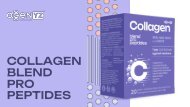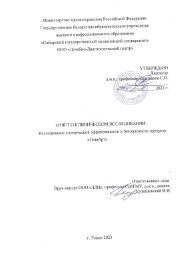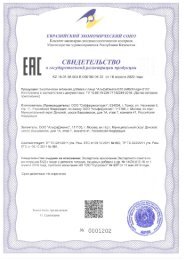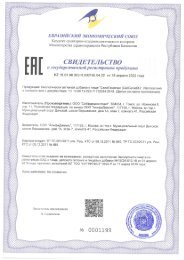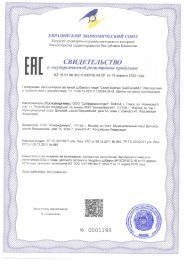Aquamin Bioavailability
You also want an ePaper? Increase the reach of your titles
YUMPU automatically turns print PDFs into web optimized ePapers that Google loves.
<strong>Aquamin</strong><br />
The Importance of <strong>Bioavailability</strong><br />
Dr. Denise O’Gorman, B.Sc., Ph.D.<br />
What is <strong>Aquamin</strong><br />
<strong>Aquamin</strong> is a natural, marine-derived, multi- mineral, from<br />
the Lithothamnion species of red algae, rich in calcium and<br />
magnesium as well as 72 other trace minerals. It is crafted<br />
naturally in the sea, providing bioavailable minerals in the<br />
same ratios as needed for optimal use by the human body.<br />
The structure of <strong>Aquamin</strong> is also unique. It is highly porous<br />
in nature maximising absorption and bioavailability.<br />
It is well accepted that calcium bioavailability is influenced<br />
and enhanced by the presence of other minerals.<br />
At Marigot Ltd, we have carried out many studies to prove<br />
the bioavailability of <strong>Aquamin</strong> over that of other calcium<br />
sources, especially those mined from rocks. These studies<br />
exploit the known sensitivity of serum parathyroid<br />
hormone (PTH) to calcium levels. Insufficient levels of<br />
calcium in the body trigger PTH to release calcium from<br />
bone, stimulating bone breakdown. Therefore, lowering<br />
PTH levels over both the short and long-term is a dual<br />
indicator of the bioavailability of calcium and of bone<br />
protection<br />
<strong>Bioavailability</strong><br />
Study 1<br />
This double-blind, placebo-controlled, cross-over study2<br />
measured the bioavailability of <strong>Aquamin</strong> versus calcium<br />
carbonate (CaCO 3 ) and placebo over 6 hours in 12<br />
pre-menopausal women. The results were dramatic, after<br />
just 60 minutes, the ability of <strong>Aquamin</strong> to reduce the levels<br />
of PTH significantly exceeded that of CaCO 3 and this trend<br />
continued for the duration of the study, Figure below.<br />
PERCENT CHANGE IN SERUM PTH<br />
15 30 60 90 120 180 240 300 360<br />
0<br />
-5<br />
-10<br />
-15<br />
-20<br />
-25<br />
-30<br />
-35<br />
AQUAMIN F CALCIUM CARBONATE PLACEBO<br />
Study 2<br />
A second longer-term, double-blind, placebo-controlled,<br />
parallel-group study lasting 3 months was also carried out.<br />
Sixty post- menopausal women were randomised to<br />
<strong>Aquamin</strong>, CaCO 3 , Tri-calcium phosphate (TCP) or placebo<br />
groups and PTH levels were recorded. After 3 months, PTH<br />
levels had significantly decreased in subjects taking<br />
<strong>Aquamin</strong>.<br />
1 Saltman & Strause (1992) J. Am. Coll. Nutr. 12(4):384-9<br />
2 Minnesota Applied Research Centre, USA (unpublished)<br />
3 Shandon Clinic, Cork, Ireland (unpublished)<br />
4 Slevin et al., Under review 2013.<br />
5 Aslam et al., (2013) Biol Trace Elem Res: In Press<br />
6<br />
7<br />
8<br />
9<br />
10<br />
O’Gorman et al., (2012) Phyto. Res. 26(3):375-80<br />
Widaa et al., Phytotherapy Res (2013) In press<br />
Barry et al., (2011) Med & Sci in Sports & Exer 43(4):617-23<br />
Aslam et al., (2010) Calcif Tissue Intl 86(4):313-24<br />
Lee et al., (2010) J Exp Biomed Sci, 16(4):213-20




